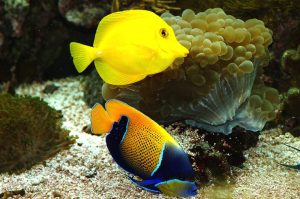With this June issue of Advanced
Aquarist we have turned an important page in our history. As you can
plainly see we have redesigned our whole web site, along with our
online publication. I hope you approve of our efforts, and we would
love some feed back from you if you are so inclined.
For some of our readers who may be unfamiliar with our long term editorial goals, goals that extend back to the days of Aquarium Frontiers, I would like on this occasion of our redesign, to communicate them again. Reef Keepers from all over the world enjoy and
find it useful to communicate their husbandry experiences, as it is
both enjoyable and sometimes valuable to share anecdotal experience.
However, anecdotal experience can too often be misleading, even down
right incorrect, and can needlessly cause the death of some of the
animals we care about. It wasn’t too long ago that almost all reef
keepers were convinced that it was impossible to keep Acroporas alive
in captivity, whereas today, Acroporas grow like weeds in many man made
reefs. Therefore, it has always been our goal to offer scientifically
based experimental information to provide a factual basis for our reef
keeping advice. The first of a two part work (An Experimental
Comparison of Sandbed and Plenum-Based Systems. Part 1: Controlled lab dosing experiments) by Rob Toonen, Ph.D. in this issue is a case in point. In Rob’s own words,
There remains considerable debate about the most efficient
design of a sediment bed for processing nutrients in a recirculating
system, but to date these arguments have been based almost entirely on
personal opinion and anecdotal evidence.
This issue is perhaps the most controversial facing both professional
and amateur reef keepers today, with many questioning whether in the
long run deep sand beds with or without plenums are better than bare
bottomed reefs. In other words, anecdotal experience is valuable, but
hardly definitive. Man made reefs are very complex biological entities,
and as most aquarists are constantly tinkering with reefs it is almost
impossible to tell what caused what. It is only in experimental
conditions where variables are accounted for that factual information
can be derived.
Hobbyists love to argue about which bulb is best, and which reflector.
Thanks to the ongoing efforts of Sanjay Joshi, Ph.D. we have provided
the reef keeper with a huge body of factually based information about
bulbs and reflectors, so that now the discussion can be based on solid
information. If you haven’t already, check out
http://www.reeflightinginfo.arvixe.com/.
In past issues we have seen Tim Hovanec, Ph.D. take on with solid
experimental data a lot of essentially useless anecdotal information
regarding the toxicity of trace metals in today’s salt mixes.
And, in this issue Dana Riddle, a tireless researcher, provides us with
useful data regarding the accuracy of test kits. In his words,
‘Test kits’ generally deliver ‘ballpark’ numbers, and this
may be fine for the average hobbyist. However, serious hobbyists, coral
farmers, professional aquarists and those providing aquarium
maintenance services might be interested in some of the newer test
equipment finding its way to market. Although not inexpensive, new
colorimeters using light-emitting diodes (LEDs) have lower prices than
units available just a few years ago. Sturdy and compact, these
instruments are easy to transport for field work, yet are right at home
in a laboratory setting.
Our editorial goal is to provide our readers with as much
scientifically based information as is available. We have always tried
to span the place between the science journal and hobbyist literature,
and will continue to do so into the future. In concrete terms, does
this new additive improve the health of our reefs, or is a snake oil;
is a deep sand bed better than a bare bottomed tank; is artificially
made saltwater as good as natural seawater, etc?

The yellow tang has been with me for almost 20-years, and the majestic for about 15-years.



0 Comments